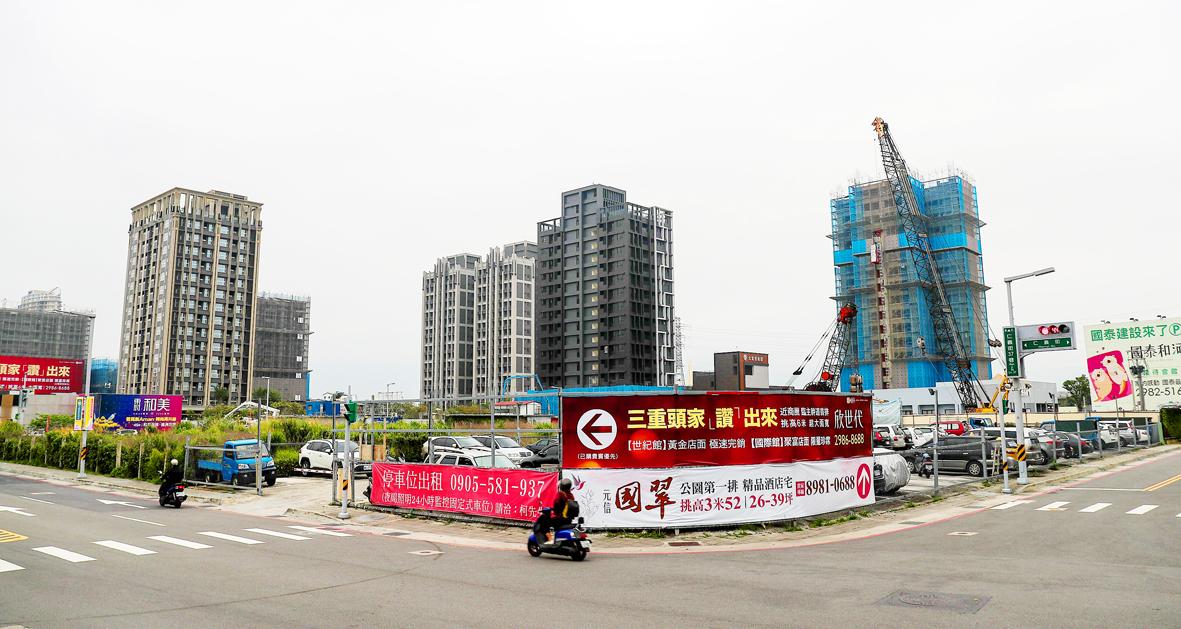The housing price index rose 1.2 percent quarterly and 3.87 percent annually to 108.17 in the fourth quarter of last year, a report released yesterday by the Ministry of the Interior showed.
Housing prices have increased quarterly for nine consecutive quarters and risen annually for 10 quarters in a row, the ministry’s data showed.
As housing prices have increased nationwide for three straight quarters, the central bank tightened lending terms in December last year and last month.

Photo: CNA
Meanwhile, the Ministry of Finance is pushing property tax revisions that would define “short-term” transactions as anything under five years, up from two years.
Under the revisions, transfers of presale projects and equities would be taxed at the same rates as properties.
Tainan reported the steepest increase in housing prices at 7.44 percent from a year earlier and 2.39 percent from a quarter earlier, the ministry said.
Property funding has flowed to Tainan in the past few years after Taiwan Semiconductor Manufacturing Co (台積電), the sole chip supplier of Apple Inc’s iPhone, made known its plans to build foundries for its newest products there.
Housing prices in Taichung increased 5.61 percent annually and 1.4 percent quarterly, the second-steepest increase in the nation, ministry data showed.
Taoyuan placed third with an annual housing price increase of 4.58 percent, followed by Kaohsiung’s 3.15 percent rise, Taipei’s 2.83 percent gain, and New Taipei City’s 2.57 percent increase, the data showed.
The ministry said that GDP growth, which hit 5.09 percent in the fourth quarter, contributed to housing price increases, while low interest rates for mortgages, which averaged 1.36 percent among the five major state-run lenders, also lent support.

South Korea’s equity benchmark yesterday crossed a new milestone just a month after surpassing the once-unthinkable 5,000 mark as surging global memory demand powers the country’s biggest chipmakers. The KOSPI advanced as much as 2.6 percent to a record 6,123, with Samsung Electronics Co and SK Hynix Inc each gaining more than 2 percent. With the benchmark now up 45 percent this year, South Korea’s stock market capitalization has also moved past France’s, following last month’s overtaking of Germany’s. Long overlooked by foreign funds, despite being undervalued, South Korean stocks have now emerged as clear winners in the global market. The so-called “artificial intelligence

Chinese artificial intelligence (AI) start-up DeepSeek’s (深度求索) latest AI model, set to be released as soon as next week, was trained on Nvidia Corp’s most advanced AI chip, the Blackwell, a senior official of US President Donald Trump’s administration said on Monday, in what could represent a violation of US export controls. The US believes DeepSeek will remove the technical indicators that might reveal its use of American AI chips, the official said, adding that the Blackwells are likely clustered at its data center in Inner Mongolia, an autonomous region of China. The person declined to say how the US government received

FORTUNES REVERSED: The new 15 percent levies left countries with a 10 percent tariff worse off and stripped away the advantage of those with a 15 percent rate In a swift reversal of fortunes, countries that had been hardest hit by US President Donald Trump’s tariffs have emerged as the biggest winners from the US Supreme Court’s decision to strike down his emergency levies. China, India and Brazil are among those now seeing lower tariff rates for shipments to the US after the court ruled Trump’s use of the International Emergency Economic Powers Act to impose duties was illegal. While Trump subsequently announced plans for a 15 percent global rate, Bloomberg Economics said that would mean an average effective tariff rate of about 12 percent — the lowest since

Standard Chartered Bank Taiwan’s newly appointed chief executive officer, Anthony Yu (游天立), yesterday unveiled an ambitious growth strategy for the bank’s wealth management division, reflecting a bullish outlook on Taiwan’s high-net-worth market. Yu, the first local executive to lead Standard Chartered Bank’s Taiwan operations, emphasized rising client demand and detailed plans to expand the bank’s digital capabilities, as well as its physical presence across the country. Standard Chartered Taiwan saw a remarkable surge in new wealth management clients last month, with the number of clients holding assets equivalent to US$1 million more than doubling compared with the same month last year, he